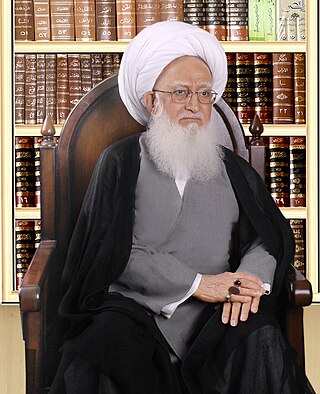
Seyyed Ali Hosseini Khamenei is an Iranian Twelver Shia marja' and politician who has served as the second Supreme Leader of Iran since 1989. He previously served as the third president of Iran from 1981 to 1989. Khamenei's 35-year-long rule makes him the longest-serving head of state in the Middle East, as well as the second-longest-serving Iranian leader of the last century after Shah Mohammad Reza Pahlavi.

Ali al-Husayni al-Sistani is an Iranian-born Iraqi Islamic scholar. A Grand Ayatollah and marja, al-Sistani is considered the leading religious leader of Twelver Shia Muslims.

Hujjat al-Islam is an Islamic honorific title which translates in English to "authority on Islam" or "proof of Islam".

Grand Ayatollah Sayyid Hossein Ali Tabatabaei Borujerdi was a leading Iranian Shia Marja' in Iran from approximately 1947 to his death in 1961.
The depiction of the Islamic prophet Muhammad is a controversial topic both within and outside of Islam. Although the Quran does not explicitly forbid images of Muhammad, there are a few hadith which have explicitly prohibited Muslims from creating visual depictions of figures. Because the different branches of Islam use different Hadith collections, there is a split on this issue between the two major denominations of Islam, Sunni and Shia Islam.

The Al-Azhar Shia Fatwa, known in Arabic as The Shaltoot Fatwa, is an Islamic fatwa issued in 1959 on the topic of Shi'a–Sunni relations by Sunni scholar Shaikh Mahmood Shaltoot. Under Shaltut, Sunni-Shia ecumenical activities would reach their zenith.
Sunni and Shia are different sects among Muslims and the difference of opinions have resulted in many Fatwas, non-binding but authoritative legal opinion or learned interpretation issues pertaining to the Islamic law. Fatwas are based on the question and answer process found in the Quran, which seeks to enlighten on theological and philosophical issues, hadith, legal theory, duties, and the Sharia law. Sunni fatwas have been used to justify the persecution of Shia throughout their history.
The Shi'a view of Aisha is generally unfavourable. This is primarily due to what they see as her contempt for the Ahl al-Bayt and her actions in the First Fitna of the time. Her participation in the Battle of the Camel is widely considered her most significant sign of such contempt. Shi'a also consider Aisha to be a controversial figure because of her political involvement during her lifetime. Aisha came from a political family lineage, as she was the daughter of Abu Bakr, the first caliph. Aisha also played an active role in Muhammad's political life; she was known to accompany him to wars, where she learned military skills, such as initiating pre-war negotiations between combatants, conducting battles, and ending wars.

Grand Ayatollah Yasubeddin Rastegar Jooybari is an Iranian Twelver Shi'a Marja'.

Tatbir is a form of self-flagellation rituals practiced by some Shia Muslims in commemoration of the killing of Husayn ibn Ali and his partisans in the Battle of Karbala by forces of the second Umayyad caliph Yazid I.

Sheikh Yasser al-Habib is a Kuwaiti Shi'i scholar, and the head of the London-based Mahdi Servants Union, as well as Al-Muhassin mosque in Fulmer, Buckinghamshire, and the writer of The Lady of Heaven. Al-Habib's work focuses on Islamic history, drawing on Shia and Sunni sources.
Sayyid Mujtaba al-Husayni al-Shirazi. is an Iraq-Iranian Shia jurist.

Ali al-Kourani was a Lebanese Shia scholar cleric. He was born in 1944 in Yater (Lebanon) In Jabal Amel, migrating to Najaf, Iraq to study in a hawza in 1958.
Criticism of Twelver Shia Islam dates from the initial ideological rift among early Muslims that led to the two primary denominations of Islam, the Sunnis and the Shias. The question of succession to Muhammad in Islam, the nature of the Imamate, the status of the twelfth Shia Imam, and other areas in which Shia Islam differs from Sunni Islam have been criticized by Sunni scholars, even though there is no disagreement between the two sects regarding the centrality of the Quran, Muhammad, and many other doctrinal, theological and ritual matters. Shia commentators such as Musa al-Musawi and Ali Shariati have themselves, in their attempts to reform the faith, criticized practices and beliefs which have become prevalent in the Twelver Shia community.
The Ahl al-Bayt is an international non-governmental organization (INGO) in Iran. It was founded in 1990 by Supreme Leader Ali Khamenei and a group of Shiite elites under the supervision of the Islamic authority of the Shiites to identify, organize, educate and support the followers of Ahl al-Bayt. This group is known for its propaganda and support of Islamist militant groups in the Middle East.

The World Forum for Proximity of Islamic Schools of Thought (WFPIST) as well as Tehran's Ecumenical Society is a forum that was established on October 1990 by order of Ayatollah Seyed Ali Khamenei in Tehran for the reconciliation between different Islamic schools and branches.
Islamic unity week (Persian: هفته وحدت اسلامی) is held annually by Muslims between the date Sunnis consider to be Muhammad's birthday and the date which Shia Muslims consider it to be.
Marja' is a title given to the highest level of Twelver Shia religious cleric, with the authority given by a hawzah to make legal decisions within the confines of Islamic law for followers and clerics below him in rank. The highest ranking marjiʿ is known as the marja al-mutlaq or marja al-taqlid al-mutlaq. A marji' is usually also a grand ayatollah.

The Najaf Seminary, also known as the al-Hawza Al-Ilmiyya, is the oldest and one of the most important Shia seminaries (hawza) in the world. It is located near the Imam Ali Shrine in the city of Najaf in Iraq, and also operates a campus in Karbala, Iraq. It was established by Shaykh al-Tusi, and continued as a center of study after the establishment of modern Iraq in 1921.











